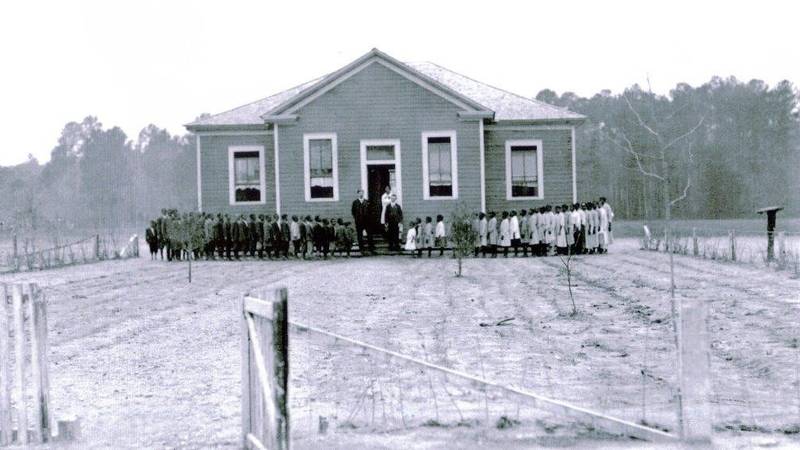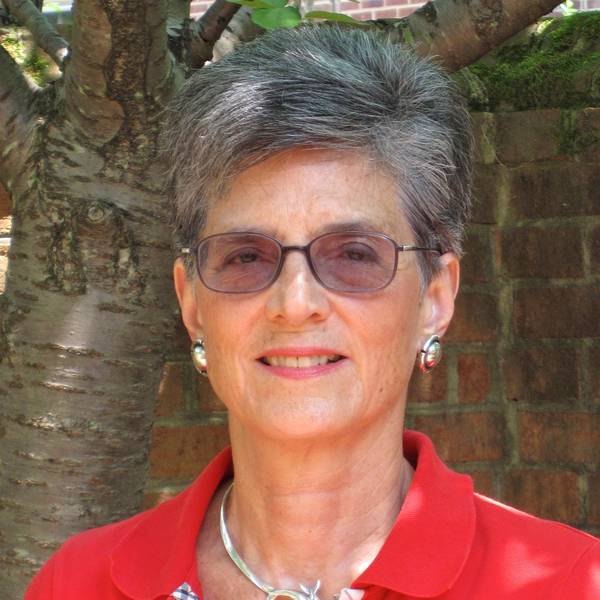Why I am working to help establish a national park site to preserve Julius Rosenwald’s legacy — the first national park site that will honor a Jewish American.
Update: In December 2020, the Julius Rosenwald & Rosenwald Schools Study Act passed Congress, a positive development and a necessary first step toward the possible designation of a National Park Service site honoring Rosenwald.
I didn’t know what to expect in September 2015 when my husband and I went to see a documentary about a man I had never heard of — Julius Rosenwald. When it was over, I turned to my husband and said, “There needs to be a national park to honor him.”

Legislation Introduced to Establish the First National Park Site to Honor a Jewish American and Preserve Julius Rosenwald’s Legacy
Julius Rosenwald’s legacy and the thousands of schoolhouses he helped construct are an important part of our country’s history, and must never be forgotten.
See more ›This “a-ha moment” set me on a journey to preserve the story of an incredible person.
Rosenwald was the son of German Jewish immigrants who fled persecution in Europe in the mid-1800s. At 16 he left his home in Springfield, Illinois, for New York City to learn the clothing trade from his uncles, never completing high school. In 1885, he relocated to Chicago and opened a company with other family members to manufacture men’s suits. Among his clients was Sears, Roebuck & Co., a struggling new company that sold clothing and just about everything else by mail order. In 1895, Rosenwald accepted an offer to invest in Sears, and this decision changed his life.
Manufacturing was booming. There was a thirst on farms and in small towns for new goods, which could be ordered from catalogs and delivered by the newly expanded mail service. Rosenwald’s organizational skills and innovative business practices transformed Sears Roebuck from a small business into the retail powerhouse of the early 20th century. In 1906, Sears began selling its stock in one of the first initial public offerings for an American retail business, and Rosenwald became wealthy beyond his wildest dreams.
The Jewish concept of tzedakah — righteousness, charity and responsibility — was ingrained in Rosenwald. Alarmed at rising prejudice and violence against African Americans, he decided to support racial justice with both large financial contributions and his personal attention.
In 1911, Rosenwald became friends with Booker T. Washington, whose autobiography, “Up from Slavery,” had inspired him. At Washington’s invitation, he joined the board of trustees for Tuskegee Institute and then agreed to assist six rural Alabama communities that were already raising money to build schoolhouses. At that time, little or no opportunity for education existed for African American children in the rural South, even though their families were paying taxes and public education was mandatory in all states.
This pilot program led to a remarkable three-way partnership that combined public funds, Rosenwald’s donations and contributions from African American communities, which, even in dire poverty, gave land, labor and materials. Over a 20-year period, 5,357 schoolhouses and other educational buildings were constructed in 15 states. They became the focus of intense pride and affection in the communities they served. One-third of African American children in the South from the 1920s through the 1940s were educated in Rosenwald Schools.
Robert G. Stanton, the first African American director of the National Park Service, also strongly supports a national park site for Rosenwald. “I grew up in Mosier Valley, one of the oldest communities in Texas, founded by African Americans shortly after the Civil War,” he said. “I personally experienced the pain and stain of segregation under the ‘separate but equal’ doctrine, attending a dilapidated two-room elementary school. With support from the NAACP, my parents and others filed suit in Federal District Court in 1949 to have a new school built in the community and eventually won the case. They were committed to quality education for their children, as were African American parents throughout the rural south. We children also possessed what Dr. Mary McLeod Bethune called a ‘thirst for education.’ The Rosenwald Schools gave many African American children access to educational opportunities that they would not otherwise have had.“
In 1928, the Julius Rosenwald Fund inaugurated a program of fellowships to individuals of exceptional merit, most of whom were African American. Over the next 20 years these grants supported nearly 900 artists and scholars, among them Langston Hughes, Marian Anderson, Ralph Ellison, Jacob Lawrence, Ralph Bunche, Charles Drew and John Hope Franklin. Twelve Rosenwald Fellows worked under Thurgood Marshall as part of the Brown v. Board of Education case before the Supreme Court, which overturned the discriminatory “separate but equal” doctrine that segregated schools during the Jim Crow era.
According to Alan Spears, NPCA director of cultural resources, “Julius Rosenwald’s legacy is inextricably linked to the advancement of African Americans in education, science and the arts. It’s rare that the gifts of one man can touch and benefit so many and in ways so profound.”
When I first learned Rosenwald’s incredible story four years ago, I had already volunteered for nearly three decades with NPCA, visited over 250 national parks and founded a friends’ group to support one of my favorite local national parks. In 2017, in partnership with NPCA and the National Trust for Historic Preservation, I launched a campaign to establish a Julius Rosenwald & Rosenwald Schools National Historical Park.
The park will consist of a visitor center in Chicago to interpret Rosenwald’s overall life and legacy and a small number of Rosenwald Schools. Volunteers with the campaign contacted state historic preservation officers in 15 states who nominated 56 potential schools. Campaign volunteers are currently visiting the schools to gather information for the Park Service, which will make the final decision on the schools to be included in the park.
We also hired a historic preservation firm to prepare a study on Rosenwald’s life and legacy. The report concluded that Julius Rosenwald and the Rosenwald Schools are of national historic significance and that the park would be an important enhancement to the National Park System.
A number of Rosenwald Schools have been restored and are still being used for a variety of purposes, frequently as community centers, but funding for ongoing maintenance is often limited. A national historical park will ensure that some of these schools will be expertly preserved and the Park Service will continue to share their stories.
When established, it will also be the first national park site honoring a Jewish American. My grandparents were Jews from Eastern Europe and Russia, respectively, who came here to escape persecution, just like Julius Rosenwald’s parents. They stressed the importance of education and social justice. Like so many immigrants, they contributed to our nation. I will be very proud to see a story that reflects some of their history shared in a new national park.
Stay On Top of News
Our email newsletter shares the latest on parks.
Stephanie Deutsch, author of “You Need a Schoolhouse: Booker T. Washington, Julius Rosenwald and the Building of Schools for the Segregated South,” was an early and enthusiastic supporter of the campaign to create the park. For her, the story is not just of Rosenwald’s extraordinary vision and generosity, but also a tribute to the energy and resilience of “the many African Americans who did not lose faith in our country even when they had little evidence that keeping faith would make a difference. They paid their taxes, which should have provided schools for their children, but when that didn’t work, they dug deep and contributed even more.”
Soon, Congress will introduce a bill to authorize the Park Service to study the significance of the sites associated with Rosenwald — a necessary first step toward creating a national park. It is my hope that lawmakers will pass the bill sometime this year.
The issues Rosenwald sought to address through his philanthropy — offering opportunity in the widest possible way, undoing the legacies of racial prejudice and anti-Semitism — these issues have not gone away. Our politics and our public life are fraught with discord. It is more important than ever that we remember and celebrate stories of people with diverse backgrounds and experiences coming together to help each other and to strive for the “more perfect union” envisioned by our founders.
Learn more at www.rosenwaldpark.org.
Stephanie Deutsch contributed significantly to this story.
About the author
-
 Dorothy Canter Contributor
Dorothy Canter ContributorDorothy Canter is a long-time NPCA volunteer, having served on the Board of Trustees for nine years. In 2017, she founded the campaign to establish a National Historical Park honoring Julius Rosenwald and the Rosenwald Schools.